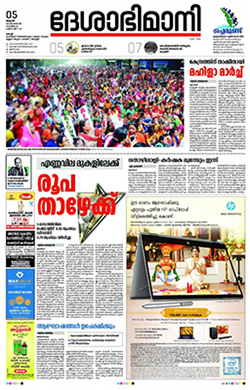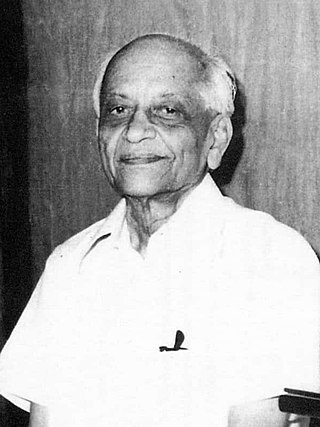Related Research Articles

Elamkulam Manakkal Sankaran Namboodiripad, popularly known as 'E.M.S. Namboodiripad' or simply by his initials 'E. M. S.', was an Indian communist politician and theorist, who served as the first Chief Minister of Kerala in 1957–1959 and then again in 1967–1969. As a member of the Communist Party of India (CPI), he became the first non-Congress Chief Minister in the Indian republic. In 1964, he led a faction of the CPI that broke away to form the Communist Party of India (Marxist).

The Communist Party of India (Marxist) (abbreviated as CPI(M)) is a communist political party in India. It is the largest communist party in India in terms of membership and electoral seats, and one of the national parties of India. The party was founded through a splitting from the Communist Party of India in 1964 and it quickly became the dominant faction.

The Communist Party of India (CPI) is the oldest communist party in India. The CPI was founded in modern-day Kanpur on 26 December 1925.

The Provisional Central Committee, Communist Party of India (Marxist–Leninist) was a communist political party in India. The general secretary of the party was Santosh Rana. The party is often referred to as CPI(ML) [Santosh Rana Group] or likewise.

Communist Marxist Party (CMP) was a political party in Kerala. The party was founded in 1986 when M. V. Raghavan was expelled from the CPI(M) due to a grave difference of opinion regarding the formation of alliances with the IUML. His support for forming a united front with parties such as the Indian Union Muslim League in order to take on alliances led by the INC was ultimately rejected by the CPI(M) leadership. He was subsequently expelled from the Party.

Ayillyath Kuttiari Gopalan, popularly known as A. K. Gopalan or AKG, was an Indian communist politician. He was one of 16 Communist Party of India members elected to the first Lok Sabha in 1952. Later he became one of the founding members of the Communist Party of India (Marxist).
K. P. R. Gopalan, popularly known as KPR was an Indian politician and a communist leader from Kalliasseri, Kerala. Once a member of the Kerala State Assembly, he lost his seat in the general election of 1 February 1960. He was subsequently re-elected. While a member, he led a failed attempt at armed revolt in the Cannanore area. At one point he was sentenced to death by the colonial authorities, before the sentence was commuted by Charu Chandra Biswas, at the urging of A. K. Gopalan.

Chelat Achutha Menon was an Indian politician and lawyer who served as the 4th Chief Minister of Kerala from November 1969 to August 1970 and again from October 1970 to 1977. He is viewed as one of the most influential Chief Ministers of Kerala.
Moolayil Narayana Menon Vijayan, popularly known as Vijayan Mash was an Indian academic, orator, columnist and writer of Malayalam literature. Known for his leftist ideals and oratorical skills, Vijayan was the president of the Purogamana Kala Sahitya Sangham and served as the editor of Deshabhimani. He published a number of books of which Chithayile Velicham received the Kerala Sahitya Akademi Award for Literary Criticism in 1982.

Deshabhimani is a Malayalam newspaper and the organ of the Kerala State Committee of the CPI(M). It started as a weekly in Kozhikode on 6 September 1942 and converted to a daily in 1946. The paper now has ten different printing centres: Kozhikode, Kochi, Thiruvananthapuram, Kannur, Kottayam, Thrissur, Palakkad, Alappuzha, Kollam and Malappuram. At present, Puthalath Dinesan State Secretariat Member of the CPI(M) is the Chief Editor of the paper, K.J. Thomas, CPI(M), secretariat member of the CPI(M), the General Manager and V. B Parameshwaran, the Resident Editor.

Shripad Amrit Dange was an Indian politician who was a founding member of the Communist Party of India (CPI) and a stalwart of Indian trade union movement. During the 20th century, Dange was arrested by the authorities for communist and trade union activities and was jailed for an overall period of 13 years.

Communism in India has existed as a social or political ideology as well as a political movement since at least as early as the 1920s. In its early years, communist ideology was harshly suppressed through legal prohibitions and criminal prosecutions. Eventually, communist parties became ensconced in national party politics, sprouting several political offshoots.

The Naxalite–Maoist insurgency is an ongoing conflict between Maoist groups known as Naxalites or Naxals and the Indian government. The influence zone of the Naxalites is called the red corridor, which has been steadily declining in terms of geographical coverage and number of violent incidents, and in 2021 it was confined to the 25 "most affected" locations, accounting for 85% of Left Wing Extremism (LWE) violence, and 70 "total affected" districts across 10 states in two coal-rich, remote, forested hilly clusters in and around the Dandakaranya-Chhattisgarh-Odisha region and the tri-junction area of Jharkhand, Bihar, and West Bengal. The Naxalites have frequently targeted police and government workers in what they say is a fight for improved land rights and more jobs for neglected agricultural labourers and the poor.
Melathu Veettil Raghavan was a veteran Communist leader and a former Minister in Kerala state of India. He was the General Secretary of the Communist Marxist Party, an alliance partner in the UDF. Prior to the formation of the CMP he was a prominent leader of the Communist Party of India (Marxist).

Azhikodan Raghavan was a leader of the Communist Party of India (Marxist).

The Indian state of Kerala has a strong presence of communist politics. Today, the two largest communist parties in Kerala politics are the Communist Party of India (Marxist) and the Communist Party of India, which, together with other left-wing parties, form the ruling Left Democratic Front alliance.
The International Conference of Marxist–Leninist Parties and Organizations (ICMLPO) was an international grouping of political parties and organizations adhering to Mao Zedong Thought founded in 1998 by the Marxist-Leninist Party of Germany. It was organized by a Joint Coordination Group and met every two or three years. It ceased to exist in 2017.

The Politburo or Polit Bureau is the highest body of the Communist Party of India (Marxist). The members of the Politburo are elected by the Central Committee in the immediate aftermath of a National Party Congress, which is held every three years.

In 1964, a major split occurred in the Communist Party of India. The split was the culmination of decades of tensions and factional infighting. When India became independent in 1947, differences arose of how to adapt to the new situation. As relations between the Nehru government and the Soviet Union improved, a faction that sought cooperation with the dominant Indian National Congress emerged within CPI. This tendency was led by S.A. Dange, whose role in the party hierarchy became increasingly controversial. When the Sino-Indian War broke out in 1962 Dange's opponents within CPI were jailed, but when they were released they sought to challenge his leadership. In 1964 the party was finally divided into two, with the left faction forming the Communist Party of India (Marxist). The split had a lot of regional variations. It also impacted other organizations, such as trade union and peasant movements. The split has been studied extensively by scholars, who have sought to analyze the various domestic and international factors involved.
K. P. Gopalan (1908-1977) was a Communist Party of India politician, minister, freedom fighter and a trade unionist from Kerala, India. He was first elected to the Madras Legislative Assembly in 1952. During his term as a member of the Kerala Legislative Assembly, he was appointed the first Minister for Industries and Community Development of the state.
References
- ↑ New Democracy . Committee of Communist Revolutionaries, 1974. p. 8
- 1 2 After Fratricide, in [Link, Vol. 15, Part 4]. United India Periodicals, 1973. p. 11
- 1 2 3 4 5 Manorama. അഴീക്കോടനെ കൊന്നതാര്? ഒരു സഖാവിന്റെ സംശയങ്ങൾ
- 1 2 3 4 Reporter TV. ആ കത്തെവിടെപ്പോയി, ഇന്നും ബാക്കിയാകുന്ന ദുരൂഹതയില് അഴീക്കോടന്റെ ഓര്മ
- 1 2 3 The Fourth. അഴീക്കോടൻ രക്തസാക്ഷിത്വത്തിന് അൻപതാണ്ട്; ആ കത്ത് എവിടെയായിരിക്കും?
- 1 2 3 4 Indian Recorder and Digest, Vol. 21 . 1975. p. 11
- 1 2 3 Guy Arnold. Revolutionary and Dissident Movements: An International Guide . Longman, 1991. p. 135
- 1 2 3 4 東南アジア要覧. 内閣官房内閣調查室, 1975. p. 37
- 1 2 3 Manoranjan Mohanty. Revolutionary Violence: A Study of the Maoist Movement in India . Sterling Publishers, 1977. pp. xxi, 166
- ↑ Far Eastern Economic Review . 1975. p. 25
- ↑ The Naxalites Through the Eyes of the Police: Select Notifications from the Calcutta Police Gazette, 1967-1975 . Dey's Publishing, 2007. p. 21
- ↑ India. Shah Commission. Interim Report, Vol. 3 . Controller of Publications, 1978. p. 79
- ↑ Subhash C. Kashyap. Reforming the Constitution . UBS Publishers Distributors, 1992. p. 102
- ↑ New Communist Party formed , in Data India. Press Institute of India, 1978. p. 328
- ↑ Link: Indian Newsmagazine , Vol. 23. 1981. p. 17
- ↑ Press in India: Annual Report of the Registrar of Newspapers for India, Part 2 . Ministry of Information and Broadcasting, Government of India, 1985. p. 327